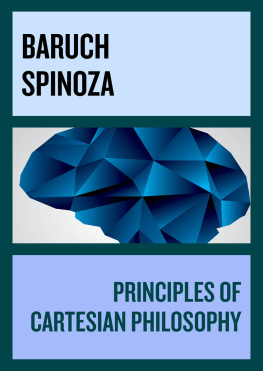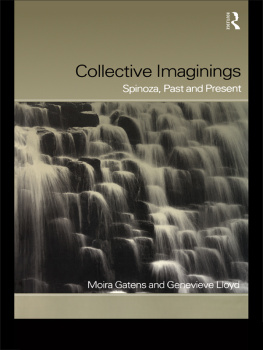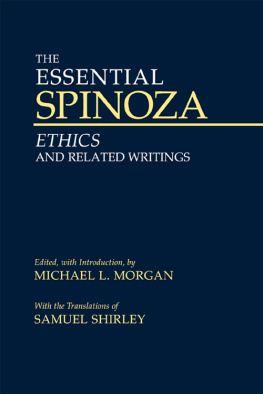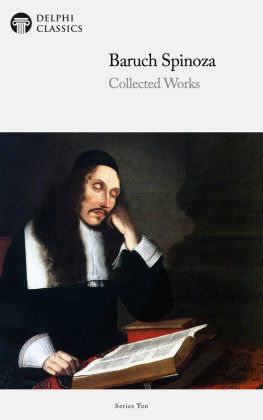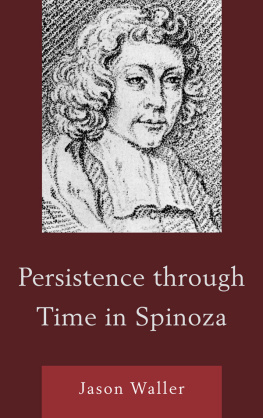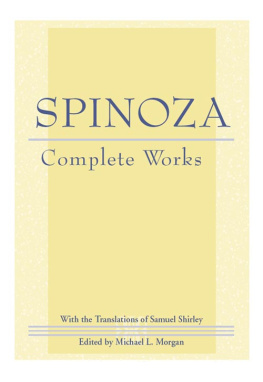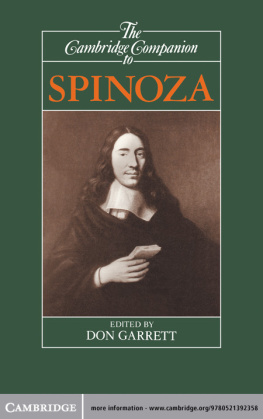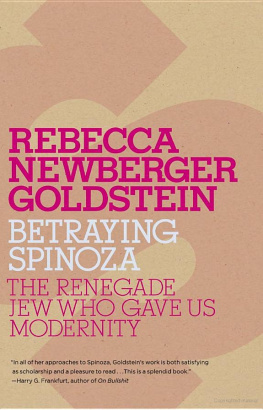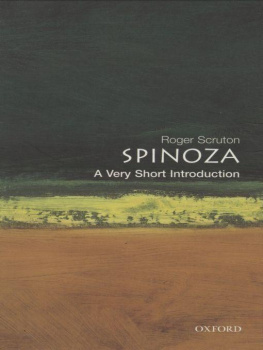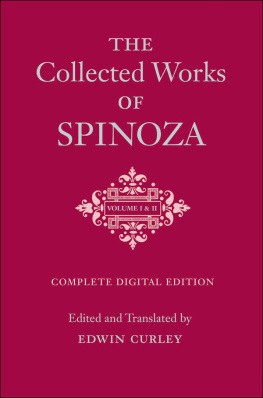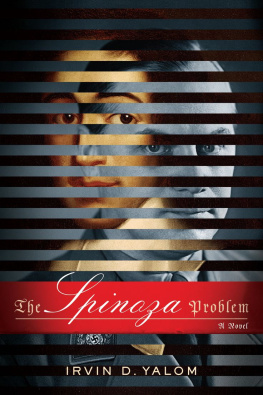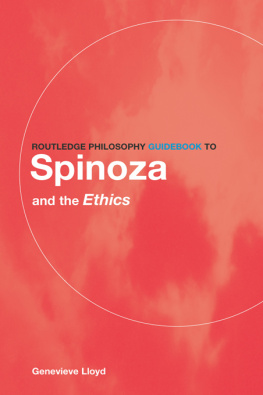Richard Popkin - Spinoza
Here you can read online Richard Popkin - Spinoza full text of the book (entire story) in english for free. Download pdf and epub, get meaning, cover and reviews about this ebook. year: 2004, publisher: Oneworld Publications, genre: Religion. Description of the work, (preface) as well as reviews are available. Best literature library LitArk.com created for fans of good reading and offers a wide selection of genres:
Romance novel
Science fiction
Adventure
Detective
Science
History
Home and family
Prose
Art
Politics
Computer
Non-fiction
Religion
Business
Children
Humor
Choose a favorite category and find really read worthwhile books. Enjoy immersion in the world of imagination, feel the emotions of the characters or learn something new for yourself, make an fascinating discovery.

- Book:Spinoza
- Author:
- Publisher:Oneworld Publications
- Genre:
- Year:2004
- Rating:4 / 5
- Favourites:Add to favourites
- Your mark:
- 80
- 1
- 2
- 3
- 4
- 5
Spinoza: summary, description and annotation
We offer to read an annotation, description, summary or preface (depends on what the author of the book "Spinoza" wrote himself). If you haven't found the necessary information about the book — write in the comments, we will try to find it.
Spinoza — read online for free the complete book (whole text) full work
Below is the text of the book, divided by pages. System saving the place of the last page read, allows you to conveniently read the book "Spinoza" online for free, without having to search again every time where you left off. Put a bookmark, and you can go to the page where you finished reading at any time.
Font size:
Interval:
Bookmark:
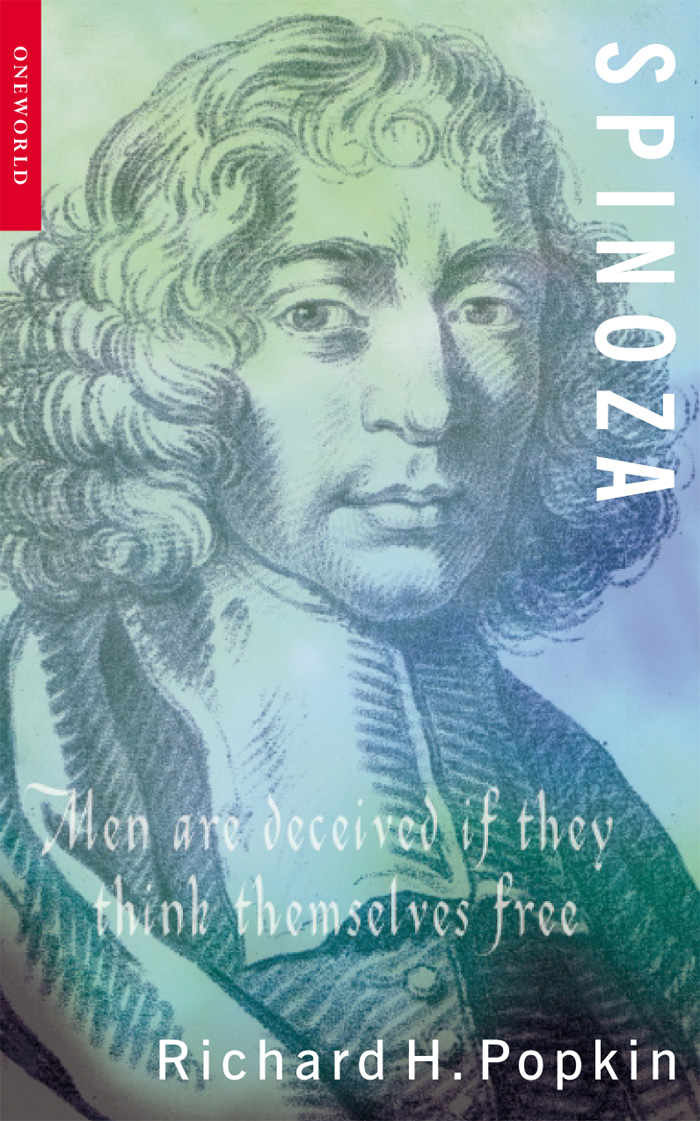
Spinoza
OTHER TITLES IN THE ONEWORLD PHILOSOPHERS SERIES
Descartes, Harry M. Bracken, ISBN 1851682945
Kierkegaard, Michael Watts, ISBN 1851683178
Nietzsche, Robert Wicks, ISBN 1851682910
Sartre, Neil Levy, ISBN 1851682902
Wittgenstein, Avrum Stroll, ISBN 1851682937
OTHER PHILOSOPHY TITLES FROM ONEWORLD
Modern French Philosophy: From Existentialism to Postmodernism, Robert Wicks, ISBN 1851683186
Moral Relativism: A Short Introduction, Neil Levy, ISBN 1851683054
Political Philosophy: An Historical Introduction, Michael J. White, ISBN 1851683283
Richard H. Popkin
ONEWORLD PHILOSOPHERS

SPINOZA
Oneworld Publications
10 Bloomsbury Road
London WC1B 3SR
England
www.oneworld-publications.com
This ebook edition published in 2013
Richard H. Popkin 2004
All rights reserved.
Copyright under Berne Convention.
A CIP record for this title is available
from the British Library
ISBN 9781851683390
eISBN 9781780744698
Cover design by the Bridgewater Book Company
Cover photograph of Baruch de Spinoza, Crayon engraving, 1762, by Jean Charles
Franois after Delhay Photo: akg-images
Typeset by Saxon Graphics Ltd, Derby, UK
Stay up to date with the latest books,
special offers, and exclusive content from
Oneworld with our monthly newsletter
Sign up on our website
www.oneworld-publications.com
Baruch de Spinoza (16321677) was one of the most intriguing figures in the history of modern philosophy. His originality, audacity, and consistent rationality made him both hated and applauded by thinkers of all kinds. He was also just about the only person in modern philosophy whose personality had as much importance as his philosophy. Whereas other philosophers have been cited for their arguments, ideas, or theories, Spinoza has been offered as the epitome of what a true philosopher should be like as a person. Hence, Spinoza has been a unique figure among modern thinkers for the last three centuries, inspiring many different currents of thought and many different interpretations.
Harry Austryn Wolfson, the renowned Spinoza scholar of the first half of the twentieth century, said that Spinoza was the last of the medievals and the first of the moderns. On the one hand, Spinoza was still using some of the categories and conceptions of Arabic, Jewish, and Christian medieval thought. On the other hand, his great contribution lay in making a clean break with religious and theological philosophy. According to Wolfson, Spinoza was the first philosopher of modern times who required no axiom or premise based on revealed religious
Spinoza dispensed with any appeal to the supernatural to account for the world and how it operates. His brilliant system developed a complete picture of the world based solely on definitions and axioms and sought to explain everything in terms of the attributes of a non-supernatural God. The attributes that human beings could know were those of thought and extension and, through these, men can discover how the world operates, what it consists of, and the role of human beings in it. This conception enabled Spinoza to present a way in which people could find their goals in non-theological terms. This remarkable break with tradition was one of the most radical innovations in seventeenth-century thought and one that has continued to spawn interesting new understandings and insights in philosophy, ethics, and science.
His two major works, the Tractatus Theologico-Politicus (1670) and the Ethics, published posthumously in 1677, advanced his radical new conceptions. Subsequent philosophers have found much to contemplate and cogitate in these works, which are still very much in the main stream of philosophical discussion.
The picture that has been formed of Spinoza the thinker and Spinoza the moral agent was developed in the first biographical accounts of Spinoza: those by Pierre Bayle, Jean-Maximilien Lucas, and Johann Colerus, as well as those of the early German Enlightenment. Bayle, at the end of the seventeenth century, was compiling his massive Dictionnaire historique et critique. He intended to include important figures that had been misrepresented or left out of previous dictionaries. In the finished product, which first appeared in 1697, by far the longest article is that of Spinoza, being ten times the size of any other article. In fact, when taken out of its folio size and when the footnotes are incorporated it turns out to be a book of over 300 pages. Entitled Het Leven de Spinoza,
Bayles article contains what is probably the first known biography of Spinoza but it is the Lucas biography that is generally called the earliest biography of Spinoza although there is no evidence that it existed before 171112. The Lucas biography, La Vie de Spinosa, first appeared in French along with a work called Lesprit de M. Spinosa or Trait des trois Imposteurs. Lucas is reported to have been a French Protestant refugee in Holland at the end of the seventeenth century who was part of a circle of spinozists. Nothing much is known of him even if he is the author of the early life of Spinoza.
Johann Colerus was a Lutheran minister in The Hague who rented the very rooms that Spinoza lived in at the end of his life at the home of the painter Henrik van der Spyck. Colerus heard much about the philosopher from the landlord and decided to put together this material with whatever else he could find out about Spinoza from people in the Netherlands. His biography of Spinoza first appeared in 17056 and was quickly translated into many languages.
Unfortunately, there is scant biographical material in the three original sources and not much more has come to light since. Thus, a lot of rumors, speculations, and fantasies have become mixed into the discussion of the life of the philosopher. We will try to unravel the various strands of Spinozas short life in the pages that follow.
First, we will try to situate Spinoza in his historical context in the seventeenth century a Jew born of Portuguese parents and raised in the Jewish community in Amsterdam, who was excommunicated from that group and then made his way in a quite different world, that of secular and Protestant society in the Netherlands. We will look at the ideas that appear in his earliest writings and in his fully developed ones, the Tractatus and the Ethics. We will then discuss his interaction with intellectuals of the time in the Netherlands and elsewhere and how his ideas came to be known to a wider audience. Finally, we will examine what sort of influence he has had over the last three centuries and more.
Spinoza was born on November 24, 1632 in Amsterdam, the son of a Jewish Portuguese mother and father. Practicing Jews had been expelled from Spain in 1492 and a large number of them went to Portugal. In 1497 the Portuguese Jews were given a choice of accepting Christianity or being banished. Many of the Jews who remained both in Spain and Portugal, and who were forcibly converted to Christianity, secretly retained some of their Jewish affiliation. The Spanish and Portuguese Inquisitions were established to police the activities of the converted Jews (
Font size:
Interval:
Bookmark:
Similar books «Spinoza»
Look at similar books to Spinoza. We have selected literature similar in name and meaning in the hope of providing readers with more options to find new, interesting, not yet read works.
Discussion, reviews of the book Spinoza and just readers' own opinions. Leave your comments, write what you think about the work, its meaning or the main characters. Specify what exactly you liked and what you didn't like, and why you think so.

